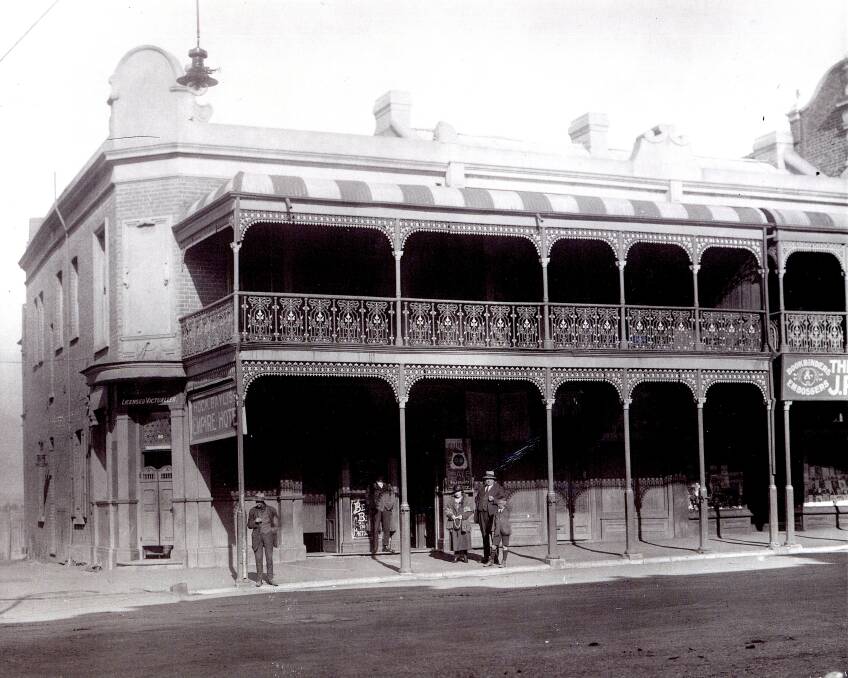
OUR photo this week, which was taken 100 years ago, is of the Empire Hotel in William Street, where the chicken shop is now located.
The original, small two-storey brick building with its shingle roof was beside a laneway. A hotel and, later, the City Bank was on the other side.
Subscribe now for unlimited access.
$0/
(min cost $0)
or signup to continue reading
When first built in 1866, it was named the Excelsior Hotel by long-time hotelier John Minehan. It initially contained six rooms, a kitchen, licensee accommodation, three stables, men's huts and other small buildings.
A well supplied an abundance of water for the well-stocked vegetable garden, along with his fruit trees.
He could "provide good accommodation for travellers, teamsters, besides the stables out the back".
Mr Minehan intended to conduct his hotel in such a way as to ensure a fair share of the public's patronage.
Mr Minehan and his wife Catherine built up quite a reputation among travelling and rural clientele.
A bagatelle licence was applied for and granted in 1870.
John Stapleton took over in 1875 and moved on when Henry Mulrowan became licensee in 1877. However, Mr Mulrowan handed the hotel over to Martin Flynn in less than 12 months.
Edward T. Lloyd took over in 1880, only to leave the following year. Henry Lucre successfully applied for the licence at Bathurst Court House in 1881.
Kelso and Bathurst hoteliers, including Mr Lucre from the Empire Hotel, were waiting to hear the verdict from the legal establishment in December 1881 after the NSW Government passed new legislation to force hotels to close at 11pm on weekdays and all day Sunday.
The act was to come into force on January 1, 1882, though most local hoteliers felt that as their current licences stated that they could open until midnight and have reduced hours on Sunday, the new law could not be implemented until their licenses ran out in June of 1882.
Local legal advice was being sought and, as it turned out, they were right.
Mr Lucre remained for three years as business improved before handing over the drinking establishment to John Coughlin in 1884.
When William H. Duff applied for the licence in 1888, he changed the name to the Empire Hotel.
He began to make changes and, around 1891, he enlarged the hotel to about twice the size. A new doorway was constructed to give patrons access to the front parlour.
Kate Glazier took over in 1901, though she did not last long, and George Kelly became licensee.
Mr Minehan returned and then left in 1906 when James Kelly took over and then Thomas Hennessey and John Kelly ran the hotel for one year each.
Frederick W. Kaiser successfully applied for the licence from 1911 to 1916 and then Francis S. Harrower operated the establishment until early 1918, before World War One finished.
In the same year, Samuel G. Pettersson intended to stay for some time, but heard the hotel could be closed and only stayed a year before Vivian G. Bayliss took over, only to have the hotel closed down on June 30, 1922.
The owner quipped that while he "ruled an Empire, he could not prevent it from falling".
In all, eight local hotels were closed.
Hotels played a big part in early Bathurst, providing a venue for relaxation, certain fluid refreshments and some home-type cooking.
Bathurst was continually being criticised by the local judiciary about having too many inns and hotels.
Over the years, there were continuing challenges to opening hours, problems with over-drinking, watered down beer and spirits as well as unclean kitchens and accommodation.
One such case of over-drinking took place in mid-February 1875 when the news arrived in Bathurst that a Dubbo man had died after drinking three gallons of brandy in less than a day.
This led to more laws being passed that all hotels had to observe.

